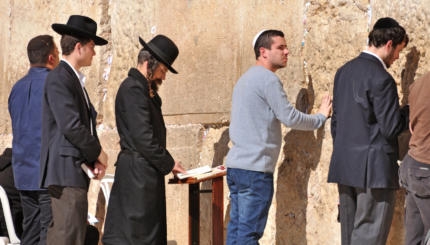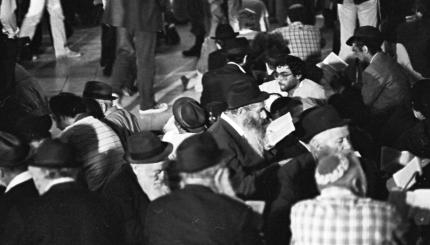Does consciousness persist after our last breath? Does a part of us live on after our bodies die and decay?
Most major religions believe so. Yet there is remarkably little in early Jewish sources on this question.
In the Five Books of Moses, the first five volumes of the Hebrew Bible, what happens to an individual after death is hardly addressed. The paucity of statements on the afterlife led some Jewish scholars to assert that there was no separation of body and soul in the Bible, that both body and soul effectively perish together. But others point to a phrase that appears ten times in the as evidence of belief that the soul survives after the body dies.
In describing the deaths of six key figures — Abraham, Ishmael, Isaac, Jacob, Aaron, and Moses — the Torah states a variation of “he died, his soul was gathered to his kin, and he was buried.” What is the significance of this middle phrase between death and burial? Some medieval commentators suggest that it referred to the gathering of souls into the collective of the righteous dead. Modern biblical scholars have found a similar phrase relating to an afterlife in the writing of other ancient Near East peoples.

Help us keep Jewish knowledge accessible to millions of people around the world.
Your donation to My Jewish Learning fuels endless journeys of Jewish discovery. With your help, My Jewish Learning can continue to provide nonstop opportunities for learning, connection and growth.
Later books of the Bible are similarly ambiguous. Psalm 115:17 states “the dead will not praise you,” which seems to point to a rejection of consciousness after death. But other scriptural passages suggest otherwise. Jeremiah 31:15 describes the matriarch Rachel long after her death weeping for her exiled children. The reader is left to wonder if the image is literal or a metaphor.
The most explicit account of survival of consciousness is in Samuel I, when King Saul seeks out the Witch of Endor in an attempt to channel the Prophet Samuel, who had died. The witch succeeds in channeling the prophet, who replies: “Why are you bothering me. I am on the other side. Tomorrow, you, King Saul, and your sons will join me.” Sure enough, the next day, Saul and his two sons are slain in battle.
By the start of the Common Era, the rabbis began to promote belief in the survival of the soul. The Mishnah (Sanhedrin 10:1) famously promises: “All of Israel have a place in the World to Come,” which some rabbis understood as a state of disembodied closeness to the creator. The implication is that if you lived as a member of the people of Israel, you lived in relationship with God and that relationship would persist on the soul level even after death. In Pirkei Avot 4:21, Rabbi Yaakov taught: “This world is like a passageway to the World to Come. Prepare yourself in the passageway that you will be worthy to enter into the banquet room.”
By the third century, a rabbinic consensus grew that body and soul were distinct and that a person’s soul might elevate in their lifetime to a higher plane of spiritual consciousness. This belief may have been influenced by Greece and other surrounding cultures that espoused such a dualism, or it may have arisen independently as a product of shared human experience.
The Talmud (Mo’ed Katan 28a) tells a story of Raba, a third-century Babylonian sage, who as his friend Rav Nahman approached death, requested that he come back and tell him what the passage was like. After Nahman dies, he appears to Raba in a dream and says: “It was like a hair being pulled from a cup of milk and yet, I would not want to do it again for the fear of dying is so painful.” This story conveys that a dimension of consciousness persists that may communicate with the living.
This story and others like it are in tension with a commandment repeated twice in the Bible — in Leviticus 19:31 and Deuteronomy 18:10-11 — prohibiting seeking out “a medium to speak with the dead.” The rabbis of the Talmud, who largely assumed that such communion was indeed possible, narrowly defined the biblical laws as only referring to mediums who engage in idolatrous practices. Many centuries later, Rabbi Moses Isserles, in his commentary on the 16th-century code of Jewish law known as the Shulchan Arukh, permitted speaking with the spirit of the dead as long as it is not to the corpse itself.
Today, many of us, no doubt influenced by the scientific model of believing only what can be seen and measured, tend to look askance at the notion of the soul’s survival, for which we only have circumstantial evidence from such phenomena as near-death experiences, mediums, and apparitions. Yet many Jews nevertheless hold to the belief that some form of consciousness survives after our last breath, even though fully understanding how that’s possible eludes us.
Maimonides wrote that to try and explain the World to Come to a person in a body is like describing color to a person who is blind from birth. Likewise, when Rabbi Harold Kushner was once asked if he believed in the survival of the soul, he replied: “Yes, as a matter of faith, but I do not grasp what it means to be only a soul. For when I think of Harold I think of the voice that you are hearing and the person that I see in the mirror. I am not sure who Harold is without this body.”
In sum, traditional Judaism evolved to explicitly acknowledge that with the last breath, the soul separates from the body and persists as a form of consciousness. The nature of the World to Come would remain a subject of dispute, with some rabbis understanding it to refer to resurrection of the dead while others describe it as a realm of spirits returning to their Divine source. Still later, Jeiwsh sources in the mystical tradition advanced the idea of the soul’s reincarnation.
What all these differing Jewish beliefs share in common is the faith that we are more than our bodies and that a dimension of consciousness, soul, survives death eternally.



